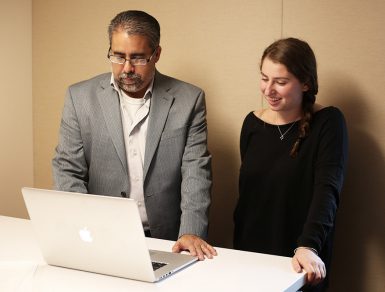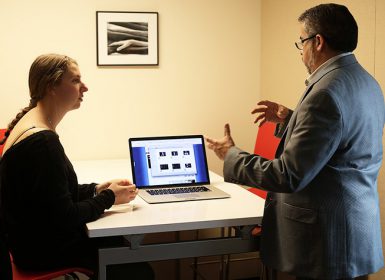Lanosga, Herman working with Indiana Debate Commission

A Media School professor and a senior are participating in the fall election process in a unique way. Assistant professor Gerry Lanosga and Nadine Herman, a senior studying journalism and political science, have been working for the Indiana Debate Commission, a nonprofit that arranges televised debates between candidates in statewide elections.
Lanosga is treasurer of the commission, which has organized four debates this season. Herman has been working as an intern, creating strategies for the organization’s social media outlets.
The project fits with both Lanosga’s and Herman’s views of service as a complement to classroom activity.
“I try to connect service and teaching,” said Lanosga, a former political and investigative journalist who worked in broadcast and print for two decades before turning to academia. “While I teach students how to be journalists, I try to keep one foot in the professional realm.”
That includes his work with the commission and with other state groups, such as the Indiana Coalition for Open Government.
Herman said she heard about the opportunity through the IU career development website.
“I’m interested in nonprofit work, and the opportunity doesn’t always present itself to work for a place like this,” she said. “So, I went for it.”
The idea for the commission was hatched in 2007, said Lanosga, one of the founders of the commission. Back then, individual media outlets negotiated with candidates to organize their own debates. This led to “a lot of competition and clamoring among the different news outlets,” he said.
Before the commission began organizing and broadcasting debates, candidates chose locations and media outlets to air debates. As a result, debates had limited distribution, which inevitably left out entire sections of the state from hosting or even seeing debates through a broadcast outlet.
The commission broadcast its first debate in 2008. Since then, its debates have been shown on 51 media outlets, including C-SPAN, and it has received hundreds of question submissions. Only Washington and Utah have commissions similar to Indiana’s.
The commission organizes the debates and provides a free satellite feed to any outlet that wants to broadcast it. It also live-streams the debates on its website. Indiana citizens are welcome to submit questions to be asked at the debates, which gives voters a chance to get answers. Lanosga said this is the aim of the commission, to help Hoosiers be knowledgeable about their elected officials and make informed decisions.
“The cost to put on a debate could be upwards of six, seven or eight thousand dollars,” said Lanosga. “We pay for the satellite, closed captions, ASL interpreter, makeup.”

Lanosga said because the commission is a nonprofit, it relies heavily on donated services such as event spaces and production work. The commission also receives cash donations from organizations such as the HSPA Foundation.
This year, the commission has been busy organizing debates for both the gubernatorial and senate races in Indiana, and the internship was developed to assist in these efforts. Nadine Herman has been onboard only since September, but has been busy updating the commission’s Facebook and Twitter accounts.
“She has helped immensely,” said Lanosga. “Before, we had a relatively sparse presence on social media, but with an increased footprint, we can reach more people. That’s important in getting the word out so people know there is a non-partisan group like us that exists.”
And in her brief time as an IDC intern, Herman has attended the second gubernatorial debate Oct. 3 in Indianapolis. She sat in the media room during the live reporting and even helped vet questions that would be asked during the debate.
“The whole experience has inspired me to look deeper into our candidates,” she said. “Also, getting to see it up close without a partisan viewpoint has taught me a lot about the process.”
As the election debates wind down, Lanosga plans to have Herman assess the success of the commission’s efforts this campaign season. She will survey both the campaigns and other media organizations about their experiences with the commission to learn how it can improve its service.
Both Lanosga and Herman said they find the work they do with the debate commission rewarding.
“This is such a big commitment this time of year,” Lanosga said. “It’s great to be able to work with volunteers, who spend hours putting these things together. It’s nice to work with people who care. Its also a great feeling to know that we can pull these things off and that we are providing Hoosier voters with a service most in other states don’t have.”
“I enjoy working with the debate commission because I feel like I am doing something good,” said Herman. “It feels good because these elections are important.”
More:

